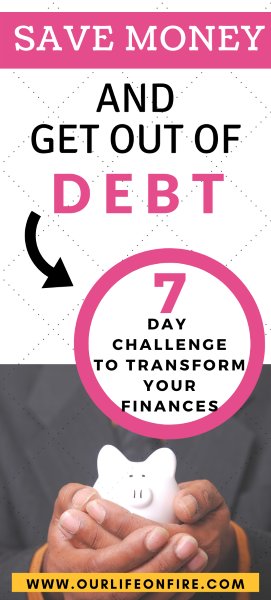
What You Can Do In One Month To Save Money And Transform Your Finances: WEEK 3
Ever wonder what it would feel like to put your money worries aside and to live life without concern for your finances? Money has always been a topic that we are open to discussing whether it be regarding paying off debt, budgeting, or investing. Luckily for us, over the years, our money discussions have turned from a bothersome topic to an exciting one.
We didn’t get to this point overnight. It has taken us many years and a great deal of ambition. We have learned that it really is all of the little changes that you make in your life that add up. Making changes and creating good habits will help you to transform your finances into something that you can get excited about.
If you haven’t already, check out Week 1 and Week 2 of the One Month Financial Challenge for even more ideas on how you can save money and take a hold of your finances.

WEEK 3:
1. Calculate Your Net Worth
Net Worth is the total of all of your assets (the things that you own that have monetary value) minus the value of your liabilities (all of the things that you owe money on such as loans). Calculating your net worth allows you to get a really good idea of where you are financially. NerdWallet has a pretty easy to use Net Worth Calculator that you should check out.
2. Pay Off Your Credit Card Bill In Full & On Time
Missing out on either of these things can hurt you financially. If you don’t pay your credit card bill on time you will incur a late fee. Multiple missed payments will result in a credit card being closed and will also eventually be sent to collections.
Not paying your credit card bill in full each month will also negatively affect you. If you only pay the minimum balance, you will rack up more interest charges, take longer to dig yourself out of debt, and if you keep a large balance on the card it can adversely affect your credit score.
3. Bike, Walk, Or Take Public Transportation When Possible
Have you ever kept track of how much money you spend on transportation? Excluding all of the money spent on car maintenance and repairs, just the cost of gas alone can add up.
Finding alternatives to driving has many benefits. Besides saving you some money and wear and tear on your car, it allows you more time for yourself. Instead of driving during your commute you can be more productive or just take some much needed downtime for yourself. You can take this time to read, meditate, or learn something new. If you choose to bike or walk it also gives you a chance to get in some physical activity, which can sometimes be hard to fit into your busy life.
4. Build An Emergency Fund
An Emergency Fund is for just that, emergencies. You may find yourself having to pay for a medical bill, major car repairs, or have a time of unemployment. Having an emergency fund will make these unexpected costs more manageable.
You should aim to save 3-6 months worth of living expenses. This is when tracking your expenses really comes in handy. It makes it easy for you to see how much you spend and how much you need in your emergency fund.
A great place to keep these funds is in a high yield savings account or a money market account. Having your money in one of these accounts will give you a chance to earn some interest. These accounts also allow for easy access to your funds as needed. Keeping your money in a separate account than your normal bank account is also important so that you are not tempted to dip into your savings.
Related Articles:
What You Can Do In One Month To Save Money And Transform Your Finances: Week 1, Week 2, Week 4
Frugal Living Tips That Make A Big Impact
5. Understand Your Insurance Coverages
Figuring out what your insurance covers, whether it be health insurance, auto insurance, or life insurance is tricky. The wording is never clear and even after an explanation it may still seem foreign. But having a good understanding of your insurance coverage can save you money. Knowing exactly what is covered can help you decide if you are paying for something that you don’t even really need. Getting rid of unnecessary coverage will help you save money over time.
6. Contribute To A Traditional IRA Or A Roth IRA
So at the time of writing this post we are all watching the fluctuating stock market. In the past week we have seen the worst decline in the stock market since 2008. So you may wonder why we would include contributing to an IRA as one of our financial recommendations.
Contributing to an IRA is beneficial in the long run. A great way to contribute is dollar cost averaging. With this method you choose a regular interval, for example every month, and invest the same dollar amount during the interval to ideally max out the yearly contribution. When you do this, you will sometimes be buying when the market is high and sometimes when it is low but over time it should balance out to the average return of the market.
When contributing to an IRA you have two options: A Traditional IRA and a Roth IRA.
Traditional IRA: Is tax deferred until withdrawn.
This would be a good option if you are in a higher (22% or above) tax bracket. It will allow you to invest your money before taxes are taken out. When you retire, you will most likely be in a lower tax bracket due to a decrease in income. In turn, you will pay less taxes at the time you withdraw your money.
Roth IRA: Contributions are taxed. Capital gains and dividends/interest grow tax free.
Before your money is invested in a Roth IRA, you pay taxes on it. This is a good option if you are young because younger people are usually in a lower (12-15%) tax bracket now versus later in their careers when earning potential is higher. The money will compound throughout your lifetime and you will not have to pay taxes when you withdraw the funds.
At the time of writing this post we have just entered a bear market. Putting money into the stock market right now can seem risky. We on the other hand see this as an opportunity. Yes there is a chance that the market will continue to go down but you will always be at risk of losing money when investing. It’s important to remember that continuing to dollar cost average or gradually increasing your contributions, while markets are significantly down from their recent all time highs, is always a good thing.
7. Do Your Own Manual Labor Instead Of Hiring Someone
So this may sound pretty simple but there are so many people who hire someone else to do something instead of just learning to do it themself. Yes, there are some people who are just much more handy than others but for everyone else there is YouTube. You can pretty much find ANYTHING on YouTube. There are so many “how to” videos that range from hanging curtains to installing a dishwasher to fixing your car.
And let’s face it, we are not all going to be getting under the hood of our car and start messing around with things that we know nothing about. But, there are also all of the smaller things you can do yourself instead of hiring someone, such as mowing your own lawn, doing a deep cleaning of your own home, or walking your own dog.
This 1 Month Challenge to Save Money and Transform Your Finances is a great way to start making some changes in your life and establish good financial habits.
We will be posting a new week of suggestions, tips, and tricks every Monday until the end of the month. There is one week left so be sure to check back for the last week of recommendations on how to save money and transform your finances. Stay tuned!
2 thoughts on “What You Can Do In One Month To Save Money And Transform Your Finances: WEEK 3”
Great Post guys, I think building an emergency pot is a big one to give you peace of mind. I have 6 months worth of essential bills saved up. As for credit cards I am not a fan, I’d rather not have one but if you do it is super important to pay it off on time.
We couldn’t agree more. Most people don’t realize how important an emergency fund is until they need it!